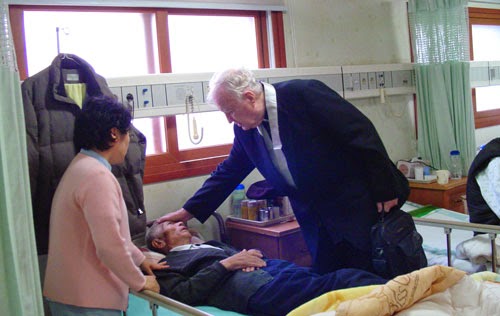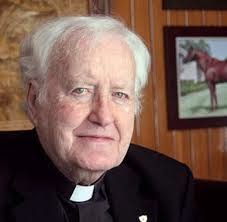Fr PJ McGlinchey
(6 June 1928 - 24 April 2018)
Patrick James McGlinchey was born in the village of Raphoe, County Donegal, Ireland, which gives its name to the Diocese of Raphoe, on 6 June 1928. He was always known as 'PJ'. In Korea he was known by the Korean name of Yim Pi-jae, a derived from the first letter of each of his English names: Yim for the 'M' in McGlinchey, pi for the 'P' in Patrick and jae for the 'J' in James. (This information is from a fine article published in Korea in 2014: Sixty years on Jejudo: Irish priest shares his memories).
He died in a hospice he had built on the island of Jeju - 'Jejudo' is the Korean for 'Jeju Island' - where he had lived for most of his life and was buried there on.
He died in a hospice he had built on the island of Jeju - 'Jejudo' is the Korean for 'Jeju Island' - where he had lived for most of his life and was buried there on.
Ar dheis Dé go raibh a anam uasal. May his noble soul be
at the right hand of God.
Below is a post I published on 16 October 2014.
Fr PJ McGlinchey with President Mary McAleese of Ireland and her husband Dr Martin McAleese
Jeju, March 2005
Below is a post I published on 16 October 2014.
Irish Presidential Distinguished Service Award for Columban Fr PJ McGlinchey
It has just been announced that Columban Fr PJ McGlinchey has been named as one of the recipients of a Presidential Distinguished Service Award for 2014 . He will be presented with the award by Irish President Michael D Higgins at a ceremony later this year. Fr McGlinchey's baptismal names are Patrick James but he is known to everyone as 'PJ'.
Arriving in Jeju, Korea in 1954 Fr McGlinchey, a priest with the Missionary Society of St Columban, was faced with a society that was deeply traumatised and ravished by poverty. Lead by his faith and knowledge in agriculture he set about helping to pull thousands of Jeju citizens out of poverty.
His model of development and profitable farming encouraged use of underused farm land and new farming methods. St Isidore farm was founded to include pigs, sheep, cows and now a stud.
Fr McGlinchey with a sick person in Korea
A textile factory, employed up to 1,700 Jeju women in a time when jobs on the island were scarce. His forming of a credit union changed the economy of the island and helped the citizens emerge from poverty.
Fr Mc Glinchey never forgot the island people setting up Isidore Nursing home, hospice, kindergarten and a youth centre which for over 18,000 young people from all over Korea. These welfare activities, some funded completely from donations and profits from the farm, take care of Jeju's most vulnerable.
For 60 years, his extraordinary drive, dedication and vision has changed the lives of those on Jeju and Ireland is now associated with this great island. His tireless dedication gave them not just hope but a belief in what they could achieve themselves.
You can read more about the work of Fr McGlinchey here.
President Ramon Magsaysay
(31 August 1907 - 17 March 1957) [Wikipedia]
In 1975 Fr McGlinchey was one of the Ramon Magsaysay awardees in Manila. His award was for Rural Development. The website of the Ramon Magsaysay Award Foundation has a biographical page on the priest here. The foundation was set up to honour President Ramon Magsaysay of the Philippines who died in a plane crash in the Philippines on St Patrick's Day, 17 March 1957.
Isidore Farm founded by Fr McGlinchey is named after St Isidore the Farmer, widely venerated in the Philippines as San Isidro Labrador or simply, San Isidro.
San Isidro (c.1070 - 15 May 1130) and his wife Blessed Maria Torribia












